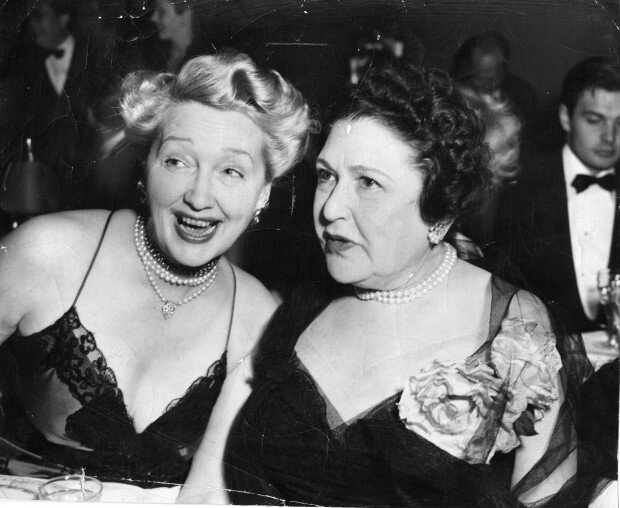Listen to this episode on Apple Podcasts or Spotify.
From the anonymous tips posted on Deux Moi to the streams of annotated paparazzi shots that fill the Daily Mail, today’s celebrity gossip -- democratized, based on technological surveillance -- looks completely different than it used to, when non-famous people could only go “behind the scenes” if led by authoritative guides. How did we get here?
This season on You Must Remember This, we’re going to go back about a hundred years, to the very beginning of the idea of going “behind the scenes,” to talk about the two powerful women who invented and dominated Hollywood gossip as it was known in the 20th century: Louella Parsons and Hedda Hopper. Parsons and Hopper were both self-made women, single moms from middle America who shattered the glass ceiling; they were also small-minded, self-obsessed bigots who used their power to persecute outsiders, police sexuality, and ensure that the rich, powerful people who made movies lived in fear. Through stories of these women, their rivalry with one another and their incestuous relationships with the institutions and powerful men that controlled media, the movies and even federal law enforcement, we’ll track the evolution of gossip over the course of a century.
Both Louella Parsons and Hedda Hopper worked for papers created by charismatic barons whose publications were nakedly corrupt, totally biased -- and absolutely mainstream. Once we get a feel for this media climate, we’ll trace Louella’s early years of struggle and reinvention on the road to her pioneering bylines, and, finally, her role in canonizing The Birth of a Nation -- the most viciously racist Hollywood blockbuster of all time.
SHOW NOTES:
Sources for entire season:
Hedda Hopper’s Hollywood: Celebrity Gossip and American Conservatism by Jennifer Frost
The First Lady of Hollywood: A Biography of Louella Parsons by Samantha Barbas
The Whole Truth and Nothing But by Hedda Hopper
From Under My Hat by Hedda Hopper
Tell it to Louella by Louella Parsons
The Powers That Be by David Halberstam
Hearst Over Hollywood: Power, Passion, and Propaganda in the Movies by Louis Pizzitola
The Chief: The Life of William Randolph Hearst by David Nasaw
Dish by Jeannette Walls
Privileged Son: Otis Chandler And The Rise And Fall Of The L.A. Times Dynasty by Dennis Mcdougal
Hedda and Louella: A Dual biography of Hedda Hopper and Louella Parsons by George Eells
Sources specific to this episode:
The Birth of a Nation: How a Legendary Filmmaker And a Crusading Editor Reignited America’s Civil War by Dick Lehr
“Nellie Bly’s Lessons in Writing What You Want To by Alice Gregory”, The New Yorker, May 14, 2014
“These Women Reporters Went Undercover to Get the Most Important Scoops of Their Day” by Kim Todd, Smithsonian Magazine, November 2016
“Sob Sisterhood Revisited” by Jean Marie Lutes, JSTOR, American Literary History Vol. 15, No. 3, Autumn, 2003
Music:
The music used in this episode, with the exception of the intro, was sourced from royalty-free music libraries and licensed music collections. The intro includes a clip from the film Casablanca.
Excerpts from the following songs were used throughout the episode:
"Intelligent Galaxy"
"Faster Does It"
"Rite of Passage"
"Base Camp" by K2
"Dirty Wallpaper" by Lemuel
"Capering" by Calumet
"Floating Whist" by Aeronaut
"Donnalee" by Bitters
"Guild Rat" by El Baul
"Our Only Lark" by Bitters
"Scraper" by Grey River
"Mknt" by Simple Machines
"Myrian" by Arc and Crecent
Credits:
This episode was written, narrated and produced by Karina Longworth.
Special thanks to our special guests. Julie Klausner played Louella Parsons. Julie wrote, created and starred in Difficult People, which you can watch on Hulu. She and Tom Scharpling also have a podcast, Double Threat, which you can and should find wherever you get your podcasts.
This episode featured a special appearance by James Gray.
This season is edited and mixed by Evan Viola.
Research and production assistant: Lindsey D. Schoenholtz.
Social media assistant: Brendan Whalen.
Logo design: Teddy Blanks.
We received the following episode correction from listener Bridget Visser:
In the episode, it is asserted that pioneering journalist Elizabeth Jane Cochran, aka Nellie Bly, married a millionaire and then used her marital wealth and connections to break into the journalism profession. While it is true that Cochran did eventually marry a millionaire, she did not meet him until well after she was already an established and internationally famous journalist.
Cochran started writing for the New York World in 1887. That same year she went undercover in a female mental institution for 10 days. The series of exposés she wrote about that experience were sensational and they made her a nationally famous household name in the US. Then, in 1889 she raced another female reporter around the world in 72 days (and won), which made her internationally famous. However, she did not even meet her husband, millionaire Robert Seaman, until years later in 1895 (she married him shortly thereafter). Also, after years of being paid significantly less than her male peers, she attempted to use this marriage to retire from journalism altogether. This, for various reasons, did not work in the long term and she did get back into journalism eventually. But, that is a long story.
While Cochran definitely did have privilege as a middle-class white woman, she certainly did not have the advantages of a millionaire's wife when she was starting out in her career. She was almost entirely a self-made success and I think that is an important distinction. How she actually broke into journalism is another long story, but essentially much of it came down to persistence, charisma, stubbornness, fearlessness, cleverness and grit.
SOURCE: Nellie Bly: Daredevil. Reporter. Feminist by Brooke Kroeger, Kindle Edition



